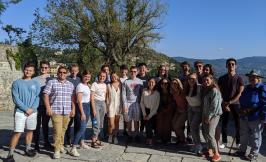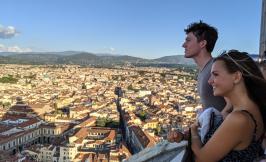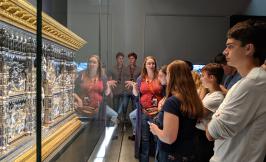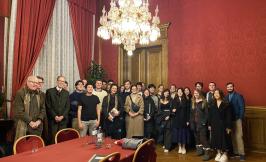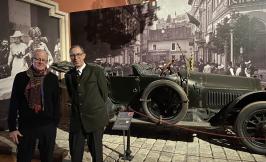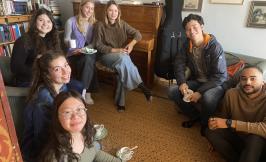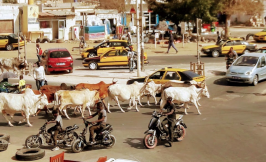History and Study Abroad
Study abroad courses at the University of Chicago are run through a dedicated Study Abroad Program that hosts exchange programs, civilization studies, and courses across the curriculum. By taking the UChicago classroom to other parts of the world, experiencing new cultures, and exploring new landscapes, students develop lifelong memories while also receiving an enhanced education. Making these trips possible, UChicago faculty regularly coordinate the programs and guide student learning in places like Dakar, Athens, Beijing, Vienna, Paris, Oaxaca, and Istanbul (to name only a few). Many of these faculty are history professors, leading courses on various civilization studies as well as on topics like Colonizations, Democracy, and Urbanism. This academic year, History professors led trips to Oaxaca, Dakar, Vienna, and Paris. More are traveling in Spring. Some of those who already led study abroad courses this year answered questions about the value of the program and their experiences.
In Winter Quarter, Dr. Emily Lynn Osborn taught African Civilizations in Dakar, Senegal. There, students experienced the thrill of a bustling metropolis with various cultural centers and civic infrastructures. Professor Osborn begins the intensive three-week course by sending students into the city. They venture out in teams with a destination in mind and a task along the way. Students must find a route to their destination and choose a theme or topic to explore while they travel. Dr. Osborn says, for example, “they might make a tally of different modes of transportation; or pay attention to the emplacement of sites of faith practices; or make note of sporting activities; or pay heed to different kinds and forms of public art. Sometimes teams get de-railed from their destination; they may need to revise their plan of action; or they may come to find that their initial theme is less interesting than something else that comes into focus along the way.”
The assignment is a learning experience for the students, a chance to realize for themselves how to navigate a new city. As Prof. Osborn explains, Dakar is “is at first, a somewhat daunting place [to many]. Most streets don't have names; it is not laid out in a grid; traffic can be terrible; and the routes and workings of buses and other forms of transportation are not necessarily evident.” Having completed their first major project exploring the city, “they are invariably more confident and assured…. The whole endeavor builds camaraderie and it fosters curiosity, and it helps encourage them to venture out and meet the city and its peoples. It also helps students to form a foundation of knowledge for topics and texts that we subsequently study in the class. They start to develop a depth of experience that they can use to engage our readings in really substantive, serious ways.”
The Senegal Civilization program, which consists of three distinct, three-week classes, fulfills the Civilization Core requirement. This intense quarter requires that a single cohort of students meet for class four days a week, with a day (or sometimes a weekend) reserved for excursions and outings designed to extend and elaborate classroom learning. The Study Abroad experience leads students to create deep bonds with each other and with their instructor. For Dr. Osborn, the experience is invaluable. “One of the great opportunities of study abroad is that you really get to know students and for them to get to know their professors.” She explains that she regularly “end[s] up serving as a letter writer for half, or sometimes two-thirds of the class that I teach on Study Abroad, which is testament to the intensity and depth of these programs – I really get to know those students.”
On a different continent, Dr. John Boyer teaches Vienna in Western Civilization and has done so since 2003. For him, too, one of the highlights of the program is that students experience a new urban environment. The classroom material is integrated with “an extensive program of excursions in the city, not only to see historic places and sites, but also to meet with local officials and other interesting local citizens to discuss contemporary political and social policy issues relevant to the course.” For example, they visited the city hall (Rathaus) and met with Dr. Veronika Kaup-Hasler who oversees the city’s engagement with science and culture.
Among the outings students in Dr. Boyer’s course took was a trip to Weitra in northwest Lower Austria. As he explains, the town is “famous for its beer manufacturing and a Renaissance castle that is still owned by the Princes of Fürstenberg. Our host there was Mr. Otmar Binder, a close friend of mine, who owns a beautiful, 17th century house in the town. Otmar and his wife, Cornelia, always host our students for a lovely brunch, and explain the history of the town and the region around it.”
Another traditional outing is to the Imperial War Museum (Heeresgeschichtliches Museum). There, they “see the car in which Archduke Franz Ferdinand was riding when he and his spouse Princess Sophie von Hohenberg were assassinated in Sarajevo in June 1914. I am able to give a lecture on the murder and just what happened in those fateful moments standing right in front of the car, and this always seems to be a highlight of the quarter for the students. This year Professor Robert Morrissey of our Paris Center was in Vienna and came along to the museum.”
Students’ appreciation for the course, Dr. Boyer’s teaching, and their experience abroad is clear. Those who took the course in 2023 presented Dr. Boyer with a card expressing their gratitude for his “near-encyclopaedic, longue duree knowledge.” For them, he “brought the history of this wonderful city to life.”
Similarly, Dr. Ada Palmer, teaches a September study abroad course titled “Florence: Living with History.” While in Florence, “a living museum of the Renaissance,” for the intensive 3-week course, students travel the city visiting a wide array of sites including monasteries, tombs, and celebrated art collections. They spend time in libraries as well as at famous historical sites and “examine contemporary Italian culture from food to friction with the growing demands of tourism, and examine how people living in the modern city of Florence work to preserve and live in balance with an urban landscape so saturated with history that every house is a world heritage site, and frescoes peep from behind every shop window display.” Of course, just as students in Dr. Osborn and Dr. Boyer’s courses make regular excursions to the surrounding environs, Dr. Palmer takes her class outside of the city to sites in the Florence and Tuscany regions, giving students an opportunity to experience not just the bustle of the famous city but life elsewhere in Italy.
This is just a small sampling of the many occasions students have to study abroad at the University of Chicago with professors in the Department of History. These experiences are unlike anything one might experience in classroom settings (although they are excellent at UChicago, too). Engaging with new cities, cultures, and building close relationships with fellow students and faculty is an eye-opening and sometimes life-changing experience. As the Study Abroad website asserts, “Whatever path you choose, you have a world of opportunity.”
 THE UNIVERSITY OF CHICAGO
THE UNIVERSITY OF CHICAGO









